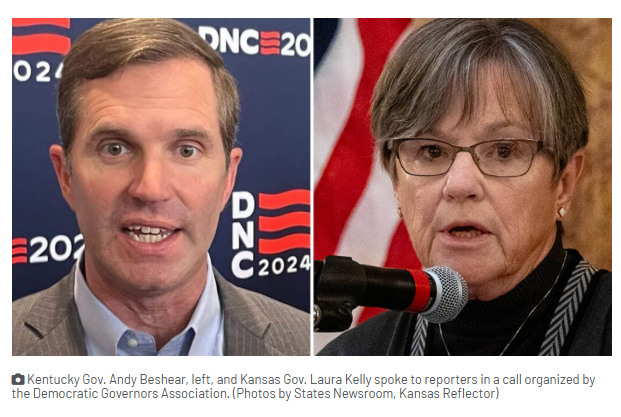GOP-backed cuts to Medicaid, food assistance would hurt their red states, say Democratic governors

(Update, June 30, 2025: The U.S. Senate advanced its budget bill on Saturday, June 28, on a 51-49 vote. On Monday, June 30, the Senate began voting on amendments to the bill in a process called the “vote-a-rama.” The bill awaits final passage. If it passes, it moves to the U.S. House for consideration of the Senate changes.)
By Jamie Lucke
Kentucky Lantern
The Democratic governors of two red states — Kentucky and Kansas — urged Republicans in Congress to scrap their massive budget bill, warning it would take health care and food away from needy Americans to give “tax handouts to the ultra-wealthy.”
“We are a better country than what we’re seeing out of this big, ugly bill. And it should not pass,” Kentucky Gov. Andy Beshear said during a Thursday, June 26, press call organized by the Democratic Governors Association.
Kansas Gov. Laura Kelly said, “I don’t think any amount of tweaking is going to make a difference in the long run. I think they just need to kill it and start over.”
Kelly, chair of the Democratic Governors Association, said the One Big Beautiful Bill Act would “slash Medicaid funding by hundreds of billions of dollars over the next 10 years and gut funding for critical food assistance programs, all while passing tax handouts to the ultra-wealthy and raising the national deficit.”
The bill — endorsed by President Donald Trump, approved by the U.S. House and awaiting action in the Senate — would make permanent the tax cuts that Congress enacted during Trump’s first administration. The nonpartisan Congressional Budget Office has said the bill would increase the deficit by more than $2 trillion, even with the spending cuts proposed over the next 10 years.
Kelly said she’s had conversations with Kansas Republican U.S. Sen. Jerry Moran and thinks he would vote against cuts to Medicaid and the Supplemental Nutrition Assistance Program because “in his core,” he knows they “are just wrong, not to mention really bad for the state of Kansas.” But, she said, “because it’s packaged with everything else, I’m afraid he’s going to feel the pressure to stay in the camp and vote with the tribe.”
Moran’s communications director, Angela Lingg, said, “The Senate is continuing to negotiate any changes to Medicaid, and Sen. Moran is working to make certain Kansas hospitals are at the forefront of those discussions.”
Republicans are moving the bill through a process called reconciliation that enables them to avoid the Senate’s usual 60-vote requirement and pass the measure with 51 votes.
Beshear criticized Kentucky Republican U.S. Sen. Mitch McConnell, who reportedly told his GOP Senate colleagues in a private meeting Tuesday that home state constituents who are worried about Medicaid would “get over it.”
Beshear called the comment, reported by Punchbowl News, cruel and callous.
A McConnell spokesman said the former Senate Republican leader was trying to remind his colleagues “that we should all be against waste, fraud and abuse while working to protect our rural hospitals and have safety nets in place for people that need it.”
Beshear said Kentucky’s other U.S. senator, Republican Rand Paul, “has expressed some disagreement with the bill. I wish it was for the right reasons. I wish it was about Kentuckians being hurt, but if he ultimately votes against the bill, then I think that’s a good thing.”
Paul has called for deeper cuts in spending, telling USA Today, “I think the big blowback is if we don’t do something to reduce the deficit, we’ll be seen as hypocrites.”
Beshear warned the Medicaid cuts would harm rural economies by shuttering hospitals, killing health care jobs and forcing residents to drive long distances to see a doctor.
Kentucky Hospital Association President and CEO Nancy Galvagni told the Kentucky Lantern on Tuesday that a U.S. Senate committee’s proposal would force Kentucky hospitals to eliminate 20,000 jobs by ending supplemental payments to hospitals that care for large numbers of Medicaid patients.
The taxes on health care providers that fund the supplemental payments are under fire from the Trump administration. Some critics have referred to them as “legalized money laundering” because states use provider tax revenue to pull down additional Medicaid money from the federal government.
Kelly said the provider tax “should be open to discussion,” but “thoughtful, deep discussions” are impossible when so many complex issues are steamrolled into one huge piece of legislation.
Beshear said the federal government has recognized provider taxes as a way to ensure that Medicaid reimbursements cover the cost of providing medical services in rural areas, keeping hospitals solvent.
“Red states typically have higher provider taxes than blue states,” he said. “So if they’re suggesting that this is some form of money laundering, which it’s not in any form of that actual legal term, then it’s their own governors that have engaged in it to the largest extent.”
Beshear called on supporters of the bill to be honest about its ramifications. He said it’s meant to “kick people off of Medicaid,” not because they’re ineligible, but for paperwork mistakes. “Somebody doesn’t check the right box and it kicks them off for six months.”
Kelly referred to the measure as the “Big Beautiful Betrayal Bill.”
The Kansas Reflector contributed to this story.